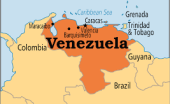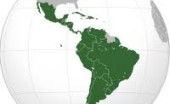Molly Minturn - My family is heartbroken to share that my father died in surgery on Monday, Feb. 10. It…
Cuba
Written by Diana Thebaud Nicholson // April 19, 2018 // Americas // Comments Off on Cuba
All Havana Broke Loose: An Oral History of Tropicana (Vanity Fair September 2011)
19 April
Castro rule in Cuba ends as Miguel Diaz-Canel confirmed in leadership change
(WaPost) In his first hour as Cuba’s new head of state, Miguel Díaz-Canel sought to make one thing clear: Raúl Castro may no longer be president, but he is still the power to be reckoned with in this island nation.
“Raúl . . . will be key to the process of making the most important decisions on the future of the nation,” Díaz-Canel, 57, said Thursday on the floor of Cuba’s National Assembly after he was formally named head of state.
The National Assembly’s procedure ended Castro rule here after nearly 60 years, shifting power toward a younger generation, born after Cuba’s revolution. Yet everything about the transition Thursday suggested a path ahead of supremely cautious change with a heavy dose of continuity.
2017
2017
5 March
Cuba Kills Another Dissident
After Obama’s detente: More tourists on the island and more repression.
(WSJ) The remarkable thing was not the death of a critic. That’s routine in a police state that holds all the guns, bayonets, money and food. What’s noteworthy is that the world hardly blinked, which is to say that two years after President Obama’s detente with Raúl Castro, the regime still dispatches adversaries with impunity. It also routinely blocks visitors to the island, even of the leftist stripe—more on this in a moment—in order to keep the population isolated. “Normalization” to the contrary, Cuba is the same totalitarian hellhole that it has been for the past 58 years.
2016
27 March
Fidel Castro responds to Obama in bristling essay
(AP) — Fidel Castro has responded to President Barack Obama’s historic trip to Cuba with a long, bristling letter recounting the history of U.S. aggression against Cuba and says ‘‘We don’t need the empire to give us any presents.’’
The 1,500-word letter in state media Monday is Castro’s first response to Obama’s three-day visit last week, in which the American president said he had come to bury the two countries’ history of Cold War hostility. Obama did not meet with Fidel Castro but met several times with his brother Raul Castro, the current president.
20 March
Obama Arrives in Cuba, Heralding New Era After Decades of Hostility
Shouts of “U.S.A.!” and “Obama!” echoed over the stone plazas as President Obama and his family made their way around rain-slicked courtyards in Old Havana on Sunday evening, savoring the adulation of Cubans welcoming him warmly despite a driving rain as he began a history-making visit.
“Welcome to Cuba! We like you!” a man shouted as Mr. Obama’s entourage passed. Above, a woman applauded and hooted from her wrought-iron balcony.
Later, a motorcade including the presidential limousine, adorned for the first time with Cuban and American flags, snaked through narrow streets where elated residents, their clothing soaked from waiting in the rain, hoisted cellphones and cheered the first sitting American leader to set foot on Cuban soil in 88 years.
Mr. Obama himself marveled aloud at the significance of his trip.
“It’s a historic opportunity to engage directly with the Cuban people and to forge new agreements and commercial deals,” he told employees of the United States Embassy, his first stop in the country, “and build new ties between our two peoples, and for me to lay out my vision for a future that’s brighter than our past.”
2015
9 February
Analyzing Obama’s Cuba Policy
by Elliott Abrams
(Council on Foreign Relations) The shortcomings of the new Obama administration policy toward Cuba have been sharply described in a recent blog post at the Cuban civil society web site SATS, by Antonio G. Rodiles. Rodiles, a human rights activist, was beaten and arrested in 2012, and released after Amnesty International and other groups protested this arrest.
First, the Obama approach grants treats the Castro regime as the legitimate government of Cuba. But it has never been elected, and should not be granted that legitimacy.
Second, the Obama approach grants that Cuba’s future and its “transition to democracy” will be in the hands of the current regime and its top officials. No political preconditions have been put in place before the United States moves forward toward diplomatic relations, removing the embargo, and taking other steps that aid the regime. The assumption seems to be that today’s powers that be –the Castros and their closest collaborators–will remain tomorrow, but that is a formula for continuing authoritarianism.
Third, the Obama approach treats democratic development and respect for human rights as the eventual product of supposed economic transformations in Cuba. But freedom should be the prime goal, not a hypothetical by-product of economic change.
John Moore: Castro’s Never Never Land
Cubans know a new version of their country is about to be born. Like any birth, it’s going to be messy and involve plenty of screaming. And how this new Cuba grows from infancy to maturity is unknowable.
They worry that American money will big foot the process and bring a curtain wall of towers to the Bay of Havana. They are wary of expatriate Cubans who, after so many years abroad, may have alien ideas of what the country craves. They’re ready to be rid of the most stultifying effects of the Castro years but fretful about what ineffable aspects of their culture and society may also be in play.
This is Cuba’s time and it’s clear a bright and exiting future lies ahead. Its people are highly educated, sophisticated and sure of who they are. What they aren’t sure about is who they will be.
19 January
Obama must work with Congress to reform Cuba embargo: policy experts
(Reuters) – On the eve of President Barack Obama’s State of the Union address a group of 78 policy experts and former U.S. officials has written to the White House urging the administration to work with Congress to update Cuba legislation to reflect “21st century realities.” While stopping short of calling for an end to the five-decades-old U.S. economic embargo against Cuba, the letter makes it clear that Congress needs to at the very least reform its Cuba sanctions, which were written into law in 1996.
15 January
Obama measures on Cuba trade, travel poke new holes in embargo
(Reuters) – The United States announced sweeping new rules on Thursday that will significantly ease sanctions on Cuba, opening up the communist-ruled island to expanded U.S. travel, trade and financial activities.
Defying hardline critics in Congress, President Barack Obama made good on his commitment last month to loosen restrictions on dealings with Cuba as part of an historic effort to end decades of hostility.
The U.S. embargo on Cuba, in place for 54 years, will remain. Only Congress can lift it.
Moving swiftly, US eases travel and trade rules on Cuba
(AP) — Swiftly expanding trade ties with Cuba, the Obama administration opened the door to easier travel and a wide range of new export opportunities with the communist island starting Friday, punching the biggest hole to date in America’s … “The U.S. government will engage with the government of Cuba to assess our aviation relations and establish a bilateral basis for further expansion of air services,” Susan L. Kurland, the department’s assistant secretary for aviation and international affairs.
2014
17 December
Obama moves to normalize relations with Cuba as American is released by Havana
(WaPost) The United States and Cuba ended more than a half-century of enmity Wednesday, announcing that they would reestablish diplomatic relations and begin dismantling the last pillar of the Cold War.
The historic move, following 18 months of secret negotiations and finally made possible by Cuba’s release of detained U.S. aid contractor Alan Gross, fulfilled one of President Obama’s key second-term goals.
The decision is likely to reverberate across many political frontiers where the standoff between Washington and Havana has played a role — including across much of Latin America, where U.S. policy on Cuba has long been a source of friction.
Obama and Raúl Castro thank pope for breakthrough in US-Cuba relations
Surprise breakthrough came after 45-minute phone call between President Obama and Raúl Castro finalised the release of US prisoner Alan Gross
Obama to announce sweeping changes to US-Cuba relations
Raúl Castro hails improved US-Cuba relations but calls for embargo to be lifted
What do improved US-Cuba relations mean for the average American?
(The Guardian) Barack Obama and Raúl Castro have thanked Pope Francis for helping broker a historic deal to begin normalising relations between the United States and Cuba, after 18 months of secret talks over prisoner releases brought a sudden end to decades of cold war hostility.
The two presidents spoke simultaneously on Wednesday to confirm the surprise reversal of a long-running US policy of isolating Cuba, detailing a series of White House steps that will relax travel, commercial and diplomatic restrictions in exchange for the release of Americans and dissidents held in Havana.
Barack Obama thanks Canada for hosting Cuba-U.S. meetings
Majority of meetings leading to reconciliation held in Canada
(CBC) U.S. President Barack Obama today thanked Canada for its role in helping the United States and Cuba thaw their relations.
Canada helped the U.S. and Cuba begin their reconciliation, American officials said earlier, by hosting gatherings of officials from the two countries.
High-level U.S. officials, on a conference call to brief reporters about the détente, said there were multiple meetings with Cuban officials in third-party countries. Officials said Canada hosted the first face-to-face encounter in June 2013 followed by a series of meetings until as recently as last month.
Canada did not participate in the substance of the discussions, but was indispensable in facilitating and hosting the discussions, an official said.
In his statement, Cuban President Raul Castro recognized the support of the Canadian government “for helping realize the high-level dialogue between the two countries.”
Pope Francis and the Vatican played key roles in US-Cuba thaw, leaders reveal
Pope sent letters to Obama and Castro calling on pair to ‘resolve humanitarian questions of common interest’ while Vatican helped broker talks
(The Guardian) The Vatican said the pope’s letters called on the two countries “to resolve humanitarian questions of common interest, including the situation of certain prisoners, in order to initiate a new phase in relations”.
The Vatican also hosted delegations from the two countries at what were said to have been the talks at which the breakthrough was made. Kenneth Hackett, the US ambassador to the Holy See, said a senior Vatican official had “played an important part in this historic moment by meeting US and Cuban delegations in October to help bring the negotiations to a successful conclusion.”
2013
23 December
 Barack Obama and Raul Castro: More Than a Handshake?
Barack Obama and Raul Castro: More Than a Handshake?
(HuffPost) A gesture says more than a thousand words. Obama behaved in accord with the dignity and protocol that comes with leading a democratic superpower. The handshake would not have been extraordinary without past deviations by the U.S. from all diplomatic norms in its policy towards Cuba. In Mexico in 2002, then-president George W. Bush put President Vicente Fox on the ropes by demanding that Mexico arrange the Monterrey summit in a way that he did not have to greet Fidel Castro. … Nothing like that could happen in South Africa. Cuba was a fundamental ally of Mandela and the ANC, and President Obama is different from President Bush. As a Senator, Obama criticized the embargo as an irrational policy with no positive results that harm only innocent Cubans. As president, he recently stated in Miami that U.S. policy towards Cuba has to be updated, because the world and the island have changed.
At Mandela’s memorial service, President Obama called upon governments to tolerate dissent as part of realizing Madiba’s legacy. This is consistent with the administration’s general commitment to international human rights. The U.S. doesn’t apologize for defending its democratic values. The call for opening space to dissent coincides with the human rights norms of the international community.
The problem is that in the Cuban case, the U.S. policy doesn’t promote a political space for dissent. Washington’s policy is obsessed with imposing a regime change selecting its favorite opposition members in line with the requirements of the Helms-Burton law. Such approach clashes with Cubans’ strong nationalist feelings. This heavy-handed interventionist distraction discredits grounded democratic demands. It is an obstacle to the development of a loyal opposition focused on Cuba’s current realities, not old dreams of a counterrevolutionary restoration.
10 December
Barack Obama, Raul Castro shake hands at Mandela memorial
Rare handshake between 2 enemies was unplanned and without substantive talks, White House says
(CBC) U.S. President Barack Obama shook hands with Cuban President Raul Castro today at a memorial service for former South African president Nelson Mandela — an almost unprecedented moment between two deeply opposed neighbours. The handshake came during a ceremony focused on Mandela’s legacy of reconciliation.
2009
23 May
U.S. Signals Willingness to Talks With Cuba
The Obama administration signaled Friday a willingness to reopen a channel with Cuba that was closed under President George W. Bush by proposing high-level meetings on migration between the countries. The gesture comes as Secretary of State Hillary Rodham Clinton is trying to fend off pressure from her Latin American counterparts to make an even bolder break from past policies by endorsing a proposal that would reintegrate Cuba into the Organization of American States.
19 April
Obama’s new Cuba policy
(Politico) President Barack Obama said Sunday that America’s 48-year economic embargo of Cuba had failed to bring change to the island, and that he hoped the country would move towards embracing democratic values, including freedom of speech and religion, on the path towards launching better relations with the United States.
“The policy we’ve had in place for 50 years hasn’t worked the way we wanted it to – the Cuban people are not free,” Obama said. But after the recent actions taken by his administration – including lifting travel restrictions and remittances for Cuban-Americans—Obama said he was looking for reciprocal moves by the Cuban government before taking additional steps.
5 December 2008
Obama Will Change Cuba Policy—But How?
(U.S, News) A first step: easing some of the tough Bush restrictions and, maybe, expanding a dialogue



